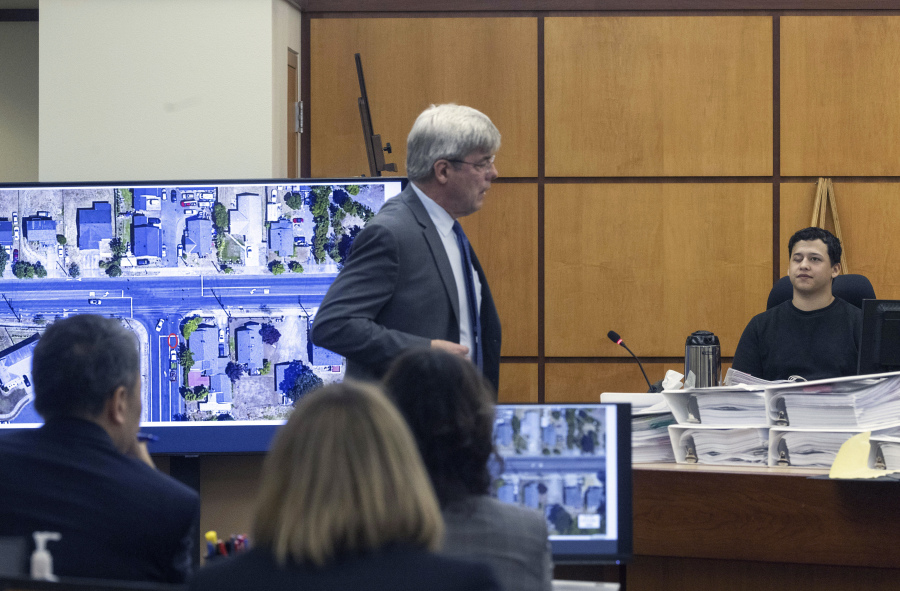TACOMA — The former Pierce County medical examiner testified Thursday that he’s even more confident now than he was in spring 2020 that Manuel Ellis’ death was caused by restraint from Tacoma police officers, three of whom are currently on trial.
Dr. Thomas Clark, a polarizing figure who left the medical examiner’s post under a pall of complaints, told jurors that medical evidence from the night that Ellis died ruled out a methamphetamine overdose and Ellis’ enlarged heart as the cause of his death. Lawyers for three Tacoma police officers currently on trial for Ellis’ death had offered both as alternative explanations.
Ellis, 33, died March 3, 2020, after being struck, jolted with Taser strikes, placed in a carotid artery neck hold and rendered unconscious, cuffed with his hands behind his back, hobbled with a cord linking his ankles to his wrists, and sat and knelt upon by officers while lying prone, with a nylon spit hood over his face. Witness videos shown in court capture Ellis repeatedly telling officers he couldn’t breathe.
Clark ruled Ellis’ death a homicide one week into national outrage and protests over the death of George Floyd in Minneapolis, and provided prosecutors the footing for the historic charges. He ruled the cause to be oxygen deprivation from physical restraint. His preliminary report noted the high level of methamphetamine in Ellis’ system and his enlarged heart as contributing factors.
But Clark testified Thursday that there were anatomical clues that ruled out those factors as the primary reason that Ellis died. He said Ellis was likely brain dead with a fading heartbeat when medics arrived at the scene. Ellis’ vital signs, recorded by medics, were not consistent with a methamphetamine overdose or sudden heart attack, Clark testified.
“I think [Ellis] died as a result of asphyxia,” Clark said. He pinpointed the convergence of three factors that caused Ellis to die: “Restraint, the spit hood, the body weight on him.”
Tacoma police officers Matthew Collins, 40; Christopher “Shane” Burbank, 38; and Timothy Rankine, 34, are charged with first-degree manslaughter. Collins and Burbank, the first officers to contact and struggle with Ellis, face second-degree murder charges as well. The trial is the first in 85 years for three Washington officers to be charged for an in-custody death.
Collins and Burbank told detectives they saw Ellis trying to enter a passing car, then he instigated a fight with them and violently resisted arrest. Four eyewitnesses, including two who filmed cellphone videos of officers roughly handling Ellis, testified that the officers attacked Ellis unprovoked.
Rankine sat on top of Ellis for minutes and admitted to detectives that he refused to get off Ellis even when Ellis issued his last words: “I can’t breathe.” Evidence in the trial shows Ellis told officers he couldn’t breathe at least five times.
All three officers have pleaded not guilty, are free on bail and remain employed by the Tacoma Police Department on paid leave. A fourth officer, Armando Farinas, placed the spit hood on Ellis. He has not been charged.
Clark said his preliminary autopsy report was issued with limited information about what had happened. For instance, the extent to which a series of officers placed pressure on Ellis’ back while he lay prone, cuffed and hobbled initially “was not given to me by police,” Clark testified.
Jared Ausserer, one of Collins’ attorneys, called Clark’s attention to two separate death rulings that seem to contradict his findings in the Ellis case. Both instances — from 2017 and 2018 — involved subjects under the influence of methamphetamine at levels lower than were found in Ellis’ system. Both had been subjected to similar police restraints, including a carotid artery hold and being handcuffed during struggles on the ground.
Clark said methamphetamine has unpredictable health effects, and said someone could take the same amount for 31 days, and die from it on the last day. “People die of wildly varying concentrations of methamphetamine, and it is not possible to say whether somebody is going to die at a certain concentration,” Clark said.
In both earlier cases Clark ruled the deaths were accidental and caused by methamphetamine poisoning. But now, in light of pressure from law enforcement he faced while he investigated Ellis’ death, he questions his rulings in the earlier cases. He didn’t describe that pressure in detail.
“Before this case I was more trusting of the information I received,” Clark testified. “It may have left me open to getting bad information, and at that time it never would have occurred to me that an employing agency would try to get me to change my finding as they did in this case.”
Clark left the medical examiner’s post at the end of 2020. While he was working on Ellis’ case, he was under unusual restrictions that barred him from direct contact with most other county personnel, the result of a complaint that he had created a hostile workplace. He agreed to a $250,000 severance package. Clark’s problems at the end of his tenure were not shared with the jury because Pierce County Superior Court Judge Bryan Chushcoff limited discussion of it.
Defense lawyers for the officers stressed to the jury that Clark has been under contract with the state Attorney General’s Office, which is prosecuting the case, for two years consulting on the charges against the officers. Clark emphasized that he strives for objectivity and did so in this case by encouraging peer review of his findings and by noting that other medical examiners might contradict his findings.
Chushcoff on Thursday directed the prosecution and defense to provide an estimated timeline for the conclusion of the trial to share with jurors on Monday, when testimony resumes. As of last week, the trial — initially estimated to be finished during the first week in December — was running three weeks behind schedule.



